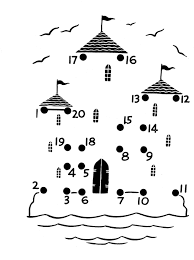|
In 1 Corinthians 6, the Apostle Paul includes a strong command that will sound counter-cultural to any American in the early 21st century: "Flee sexual immorality" (1 Corinthians 6:18).
As we read this command, we may ask, "How can Paul say this?" The short answer is that Paul's gospel-centered theology drives the way he thinks about ethics and lifestyle issues. To see this, we need to zoom out a bit and look at the larger context.
0 Comments
Based on the number of "hits" each month, here are the top 5 posts here on the Brookside Institute blog for the last six months - January 2017 through June 2017. Take a minute to scroll through the list below and either catch up on things you may have missed or revisit things that were especially helpful.
Every now and then I try to take some time and reflect on why the intentional teaching ministry of the church remains important. Whatever shape it takes, why is equipping and a teaching in the church, for the church, and by the church valuable?
At least one reason is the growth of secularism, pluralism, and "indifferentism" in America. Very simply stated, secularism is a worldview that pushes God to the margins. It's fine to believe in God on your own, the secularist may say, just don't bring any religious ideas or reasoning into the public square. Pluralism flows out of the reality that we are surrounded by people who believe very different things than than us - and it often goes a step further to say the no one religion can be exclusively true. "Indifferentism" (this is my term, I think) tries to explain the religious apathy of the "nones" and "dones" - those who adhere to no single religious expression (the "nones") or those who have "tried out" some religion and - for whatever reason - didn't stick with it. So what does all this have to do with catechesis - an intentional and systematic approach to teaching in the local church? Here's what: (This is an updated version of a post I initially composed on July 22, 2014.)
I've recently gotten a few questions from people asking very specifically how they can get emails with updated posts from the Brookside Institute blog, without having to remember to check in periodically on their own. They want to stay in the loop, but they won't always remember to go looking for new content. And when they do remember, they may not be near a computer or it may not be a convenient time. I love this question. I love it that people want to stay in the loop, and that we're providing valuable enough content that people want to stay engaged. Here's how I respond to this question: There's no way that I know of to get emails specifically from the Brookside Institute, providing updated content as new posts are published. (If I'm missing something on this, someone please let me know!) However that doesn't mean there's no way to conveniently stay in the loop. The solution is to subscribe to something called a "feed reader" that will collect the content (the "RSS Feed") you want from sites you subscribe to. Then, you simply monitor your feed reader and can conveniently stay up to date on the content you've chosen to subscribe to. Below I've included some detailed steps on how to subscribe to an RSS Feed and have it collected into a feed reader. Before I get into that, though, let me briefly share WHAT an RSS Feed is and WHY subscribing to the RSS Feed can be helpful. This post is a (very slightly modified) duplicate of a post I wrote about a year ago. Since Brookside has recently read through Jeremiah 29 as part of the 365 Reading Plan, I figured it was fitting to update and re-post. It doesn't take much for Christians to look around and observe that - in certain important, noticeable ways - our cultural landscape "looks" less Christian (from the standpoint of a traditional Judeo-Christian ethic) than it did even a few short decades ago.
As we notice these shifts, it's important that Christians NOT respond in panic or fear. Rather, we as Christians need to keep asking ourselves the sorts of questions we should ALWAYS be asking: What does faithful Christian living look like in our culture? What does faithful Christian living look like when we interact with others who hold different values - perhaps very different values? Or the specific question we'll be considering in this post: How can we as Christians keep our footing amidst the shifting soils of our larger culture? Thankfully, we are not left to ourselves on how to answer this question. Back in the time of the Old Testament prophet Jeremiah, God's people spent some time exiled from their homeland. In this environment, they could look around and easily observe how much distance there was between their values as God's people (values given to them by God), and certain values of the dominant culture. In Jeremiah 29, we see how the Lord counseled His people to keep their footing in the midst of this situation in Jeremiah 29. I read through this chapter again recently (I encourage you to read through the whole chapter as well), and see great wisdom in listening to five things we learn there: What is Moralistic Therapeutic Deism? And How Does it Stack Up Against Biblical Christianity?5/10/2016 Every now and then, a new word or phrase is coined that takes on a certain life of its own. Sometimes, the word or phrase catches on because of its novelty or popular appeal - think of "yada yada yada," for example.
Other words catch on because they accurately label something that people have been experiencing, but don't yet have a term for - hence the words "tween" and "emerging adult" are now commonplace. Other words in this category may not be as widely used as "tween" but they're nevertheless very important, because of how they accurately and succinctly describe something that seems to be going on around us, that we need words for. This is where I'd like to introduce you to one such term (if you've not heard of it already), Moralistic Therapeutic Deism. It's tough to overstate how important of a term "Moralistic Therapeutic Deism" (MTD) is. In an article on Moralistic Therapeutic Deism, sociologist Christian Smith suggests it is the "de facto dominant religion among contemporary teenagers in the United States" (p. 46). In other words, MTD is the default, often-unconsciously held, religious perspective/worldview among many teens and emerging adults. Even if you've never heard the "Moralistic Therapeutic Deism" label before, it's likely you've encountered one of the many ways MTD sends ripples out into many different areas of society. You may have experienced some variant of MTD in a religious service, a conversation with someone else, or in your own default perspective on things. If Moralistic Therapeutic Deism is so prevalent and is such a big deal, there are at least two important follow-up questions that readers of this post are invited to ask: What exactly is Moralistic Therapeutic Deism? And how does it stack up against biblical Christianity? Let's dig more deeply into each of these. As Brookside Church has been reading through the Bible in 2016, one of the questions I've gotten numerous times relates closely to this question: "What's Up with All the Violence in the Old Testament?" Earlier this week, I taught a Brookside Institute seminar on this topic - giving others the opportunity to dig more deeply into it and interact about it. Below I've included the audio from this seminar. Or, if you're interested in a text version of what was covered (things will be pretty similar to the audio, though not identical) keep reading below. At the very end of this post I've include a PDF "Answer Key" of the handout I made available.
As part of Brookside's plan to spend time daily reading through the Bible in 2016, the Institute is offering a series of seminars that will line up with what we're reading and dig deeply into certain topics. And as we've been reading through the first five books of the Old Testament, one of the remarks/questions I've heard repeatedly goes something like this: "What's up with all the violence in the Old Testament?!" I've gotten this question enough times to think that this will be a good topic to devote a seminar to! People who are antagonistic towards Christianity (and/or religion in general) often use some of the "violence passages" in the Old Testament as ammunition against religion. Famously, Richard Dawkins has said The God of the Old Testament is arguably the most unpleasant character in all fiction: jealous and proud of it; a petty, unjust, unforgiving control-freak; a vindictive, bloodthirsty ethnic cleanser; a misogynistic, homophobic, racist, infanticidal, genocidal, filicidal, pestilential, megalomaniacal, sadomasochistic, capriciously malevolent bully" (The God Delusion, p. 232). Even if you only understand half of those words, you know that Dawkins isn’t being complimentary. And from this language that Dawkins uses, we see that a large part of his critique is directed at how he understands the violence we read about in the Old Testament. Does the violence we read about in the Old Testament mean that God is a bloodthirsty ethnic cleanser? Is he sadomasochistic, and a divine bully? How should followers of Jesus Christ who maintain the authority of the Scriptures think about this violence that is obviously evident in the Old Testament? This coming Wednesday evening - on March 30, 2016 - the Brookside Institute will be offering a seminar that wrestles with this question and offers a way forward. Whether you're an attendee of Brookside Church or are simply in the Omaha area and want to dig into this in a gracious, respectful way, we invite you to join us. There's no cost to attend, but you can help us know how to plan by signing up here. Interested in other seminars that the Brookside Institute will be offering this year? Or do want to see some things we've already done that line up with what Brookside Church is doing as we read through the Bible? Click here to see more.
Late last week, I was able to present at a Teacher In-Service for Cornerstone Christian School. The topic I was asked to teach on was "The Importance of the Christian Worldview." After studying for the talk and interacting with the teachers, I'm as convinced as ever that Christians need to understand what worldview is, why a Christian worldview is so important, and how we grow in our understanding (and embodiment!) of the Christian worldview.
This topic breathes purpose and perspective into how we think about the different "arenas" of our lives (e.g. jobs, entertainment, family, etc), and it prompts us to think well about God and His Word, the Bible. Keep reading to see the talk I gave (in a somewhat modified, abbreviated form) on Christian worldview. At the very end of this post, I've included an "answer key" version of the handout I made available to the teachers. A few weeks ago, my oldest son got a 3D Wooden Puzzle called the "Prisoner's Ball" - check out the pictures at the top of this post to see what it looks like. The goal is to disassemble the interlocking wooden pieces in such a way that the ball in the center can be freed.
My oldest son worked diligently on it for quite a while (he's usually pretty good at these sorts of things), but with no luck. Then I tried my hand at it for longer than I'd care to admit - also with no luck. Even with devoted attention and lots of effort, we didn't unlock the puzzle. It was kinda confusing, discouraging, and frustrating. A couple of weeks later, I ended up "cheating" and searching for clues on YouTube (insert simultaneous smile and *head of shame* here - ha!). (Spoiler alert: Here's the video.) In about 5 minutes, the guy on the video explained how to work through the puzzle in such a way that the ball could be released. The puzzle that was initially disorienting and discouraging became doable. In my experience reading through Leviticus and talking with many others reading through it as well, I wonder if our reading of Leviticus can often feel like my attempts at figuring out the Prisoner's Ball Puzzle. We apply attention and spend our effort, but we end up confused, frustrated, and discouraged. But let's not resign ourselves to feelings of defeat, or feel like we need to forecast "trigger warnings" every time we talk about Leviticus or begin reading it ourselves! While there is much in this book that can be disorienting to 21st century American readers, that's doesn't mean we should avoid the book. After all, this book is part of God's inspired Word, the Bible! The message of Leviticus would have been something Jesus meditated upon as an observant Jew. And Leviticus is certainly included in the "all Scripture" that is inspired by God that Paul mentions in 2 Timothy 3:16-17 - "all Scripture" (including Leviticus!) that is useful for "teaching, rebuking, correcting and training in righteousness, so that the servant of God may be thoroughly equipped for every good work." Just like a few tips helped me figure out the Prisoner's Ball Puzzle, so too a few tips can helps us move into and through Leviticus in such a way that we understand and appreciate its message (and live accordingly) - even if parts of it still sound foreign and stretch our understanding. With all that said, then, let's briefly introduce ourselves to a few important tips that can help you move into and through Leviticus in a right way: |
Tim WiebeChristian. Husband. Father. Pastor. Learner. Contributor. Reader. Categories
All
Archives
June 2024
|
© 2014-2024 | 11607 M Circle, Omaha NE, 68137 | www.thebrooksideinstitute.net













 RSS Feed
RSS Feed
